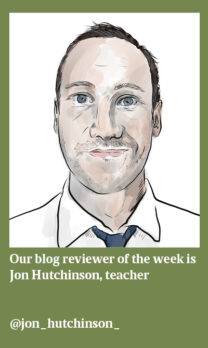“The main thing is to keep the main thing the main thing”, says Stephen Covey, author of The 7 Habits of Highly Effective People. For teacher trainer Matt Perks, there are actually three main things underpinning all of the beautiful complexity of teaching: planning, behaviour and subject knowledge. This blog, which deals with the latter, is brief but brilliant, arguing for the primacy of subject knowledge in effective teaching and offering some classroom applications and tips.
An open letter to Peter Thomas, chair of the National Association of Teachers of English
“Surely, the role of a subject association is to share subject-specific expertise and pedagogy, not to look down its nose at teachers who are actively seeking it out?” Caroline Spalding’s open letter to the chair of the National Association of Teaching English is professional, erudite, and unflinchingly robust. Underneath the surface of the letter, larger themes bubble away. Most pertinently: the legitimacy of subject associations representing teachers in the context of grassroots, self-organising movements such as #TeamEnglish and other social-media based initiatives.
10 picture books for year 1. Actually there’s 12 but who’s counting?
Philip Pullman once said that “there are some themes, some subjects, too large for adult fiction. They can only be dealt with adequately in a children’s book.” We are living in a golden age of children’s fiction, and that is most true in the avalanche of achingly brilliant picture books published over the last few years. In this blog, Simon Smith has painstakingly curated 10 (or 12, if you’re counting) of the best for year one children, but there are links to lists for every other year group in primary. Fair warning, I’d lock your Amazon account before reading this one.
Vocab teaching: summary for busy teachers
@liaesthermartin
Teaching vocabulary effectively is fundamental to pupils’ success. In this blog, English teacher Lia Martin argues “we need our energy focused on the middle section: the tier 2 words that pop up across a range of texts and that are more frequent in writing than in speech”. What follows is an invaluable summary of teaching vocabulary both implicitly and explicitly drawing on the work of Doug Lemov, Isobel Beck and Daisy Christodoulou among others. Although it’s pitched at English teachers, this is an area that teachers of all subjects should take seriously.
In this timely blog, Steve outlines the writing of leading lights in the so-hot-right-now curriculum debate – Mark Lehain, Clive Wright and Clare Sealy – before challenging the reader to consider “what is your Ovid?” In other words, what are the foundational bits of your subject that your children would benefit from knowing. Those on the poles of the “knowledge-rich” curriculum debate will find this blog respectively compelling or contemptuous, but for the majority of us who are somewhere in between, it presents a delicious challenge.
Serendipitously, the gauntlet thrown down in the previous blog is claimed and skilfully wielded by geography teacher Grace Healy. In this blog, the subject of the matter is the matter of the subject, and Grace addresses this issue with academic brilliance (the blog is meticulously referenced) and infectious humility. Inspired by Taking curriculum seriously, Christine Counsell’s masterful article in the Chartered College of Teaching’s Impact journal, Grace unpicks the concept of disciplinary knowledge within her subject, arguing that “geography teachers need the time and space to sustain their subject expertise, so they can go some way to rendering the discipline visible to students”. If everyone thought about their subject the way that Grace does, teaching would be in a very good position indeed.













Your thoughts